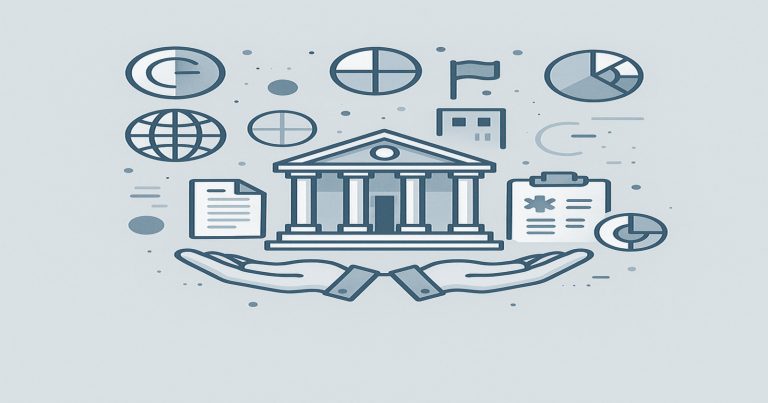Revenues and expenditures are crucial components determining the path by which a government plans to conduct its monetary business, balancing income generation and spending obligations. This annual financial statement is about the income and spending strategy adopted by the government for the fiscal year to indicate where priority is being given, either to sectors like education, healthcare, infrastructure, or defence, among others. The different components of a government budget must be identified to understand how economic policies influence the growth and development of any country.
What is the Government Budget?
A government budget is a comprehensive statement of the government’s estimated receipts (income) and expenditures (expenses) for a specific financial year. The government budget is an agenda that guides the sources of raising revenue, costs, and the channels through which the government fulfils its objectives in society and the economy. Well-designed budgets can ensure resource allocation, economic stability, and population control in terms of developing the policies for the economy.
Significant Components of the Government Budget
The constituents of the government budget, thus, are a basic instrument for managing the country’s economic performance and policies towards sustainable development.
- Receipts: Money earned through fees, penalties, borrowing, and taxation
- Expenditures: These cover all essential public services, subsidies, infrastructure development, and social programs
- Deficit or Surplus: To know if government spending exceeds income or if it is the other way around.
How is this Budget Planned?
Planning the government budget involves a complicated process of aligning economic needs with financial capabilities. It is a well-structured process of forecasting revenues, predicting expenses, and evaluating past budgets.
Steps in Budget Planning
Effective budget planning brings about fiscal discipline and guarantees optimal resource use by the government in national development. The planning process ensures that all parts of government budgets receive proper evaluation.
- Revenue Forecasting
- Forecasting the government’s revenues through taxes, customs, duties, and other revenues.
- Economic determinants such as the inflation rate, growth in GDP, and employment rate are considered.
- The discovery of areas where significant expenditure occurs includes health, education, infrastructure, and defense.
- Specific public welfare measures and schemes for economic development are prioritized.
- Allocating Funds
- It involves allocation among various government arms and schemes where government funds are distributed.
- Applying the funds for efficient use to minimize wastage and maximize impact.
- Approval and Implementation
- Presentation of the budget before the legislature for approval.
- Monitoring and bringing in the necessary corrections through budgetary allocations.
Every stage from planning to implementation involves the accurate assessment of the components of the government budget.
What are the Components of a Government Budget?
Understanding the components of the government budget is essential for grasping how the government handles public finances. These components are divided into two primary categories: revenue and expenditure.
Revenue Budget
- Revenue Receipts:
- Includes all money received by the government from taxes (income tax, corporate tax, GST, etc.), duties, fees, and fines.
- Non-tax revenue sources include dividends from public enterprises, interest on loans, and foreign grants.
- Revenue Expenditure
- Expenditures that do not create productive assets, such as salaries, subsidies, interest payments, and pensions.
Capital Budget
- Capital Receipts: Capital receipts are the funds derived from loans, disinvestment, or recovery of past loans, while capital receipts include borrowing from domestic and foreign sources.
- Capital Expenditure: Purchase of physical assets, which includes expenditure incurred on infrastructure, machinery, and buildings, as well as public projects, has long-term economic benefits..
These components of a government budget collectively outline the government’s financial strategy, focusing on both short-term and long-term economic objectives.
What are the Objectives of the Government Budget?
The purposes of government budgeting relate to stabilizing economic activities, income distribution, and growth in sustainable development. The components of government budget help the government in reaching these broader goals.
Economic Stability
Stabilization of rates through fiscal policies. Constant growth and sustainability in GDP indicators are other objectives.
Resource Allocation
Directing funds towards essential services like education, healthcare, infrastructure, and defense. Prioritizing social welfare programs to uplift marginalized communities.
Reducing Income Inequality
Implementing tax policies that promote equitable income distribution. Providing subsidies and financial aid to the economically weaker sections.
Promoting Employment and Growth
Investing in infrastructure projects that create jobs and boost economic activity. Supporting small businesses and startups through grants and tax incentives.
By achieving these objectives, the components of a government budget ensure balanced and inclusive development.
What is the Impact of the Government Budget?
Every aspect of the government budget design impacts several sectors of the economy. Hence, it affects the nation’s growth, the people’s general welfare, and the economic direction.
Economic Growth
Stimulates GDP growth by allocating funds to productive sectors like industry, agriculture, and infrastructure. Supports innovation and technological advancement through investment in research and development.
Social Development
Fund healthcare, education, sanitation, and housing projects for the public good. Provide job opportunities and social security measures toward poverty alleviation and unemployment.
Fiscal Deficit Management
A well-planned budget helps reduce fiscal deficits by balancing revenue generation and expenditure. Encourages prudent borrowing and effective utilization of funds to avoid excessive debt.
Investment Environment
It sets tax-related incentives for creating a flexible business environment, influencing the investment climate. Attracts and provides FDI by publicizing its stable economic policies and infrastructure establishment.
The aspects of the national government budget would indelibly mark the economic growth trajectory, social infrastructure development, and global positioning of the specific nation.
Components of Government Budget FAQs
1. What are the components of government budget?
The two main government budget components are the Revenue and Capital Budget. These cover all income and expenditure items.
2. What is included under revenue receipts?
Revenue receipts include all money received from taxes, fees, fines, and non-tax sources like dividends and interest.
3. Why is capital expenditure important?
Capital expenditure leads to the creation of long-term assets like roads, schools, and hospitals, which help in economic development.
4. How does the government use the budget to reduce income inequality?
The government allocates resources through tax policies and subsidies to help weaker sections of society.
5. How are the components of a government budget decided?
They are decided through revenue forecasting, identification of key expenditure areas, and approval by legislative bodies.


